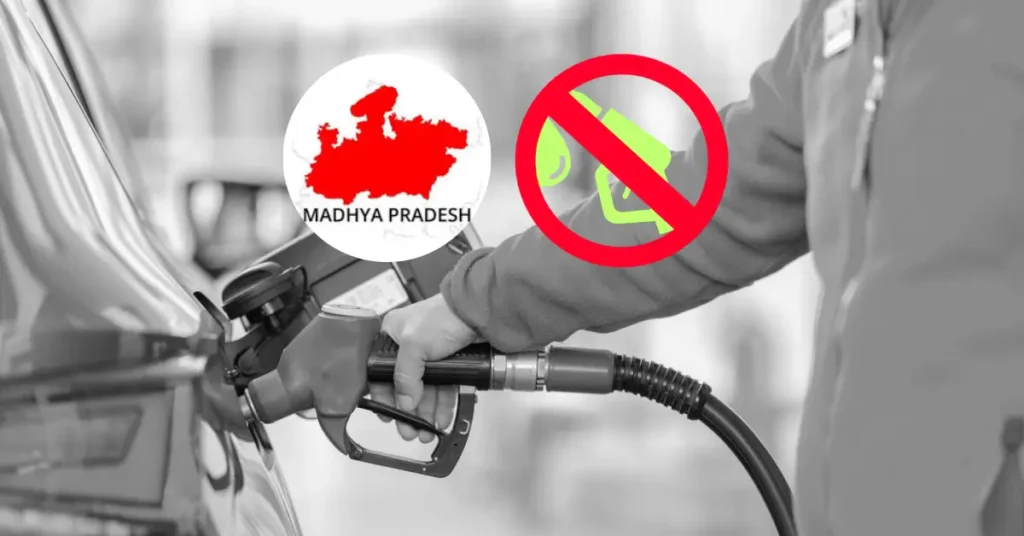
After the petrol/diesel ban in Delhi, the Madhya Pradesh government is also planning to ban 15-year-old petrol and 10-year-old diesel vehicles. The Madhya Pradesh Government is considering banning old and outdated petrol and diesel vehicles to tackle the worsening air quality in the state.
Major cities in the State have recently experienced worsening air quality, making traffic congestions, growing infrastructure projects and increasing pollution from outdated vehicles a significant health concern.
As a result, the Madhya Pradesh Government is proposing a ban on petrol vehicles older than 15 years as well as on diesel vehicles older than 10 years.
Under this ban, fuel will not be sold to these old vehicles and they will also not be eligible for fitness certificates in the state.
The proposed ban is anticipated to be enforced in major cities, such as Bhopal, Gwalior, Jabalpur and Singrauli, where air quality index has recently worsened.
The proposed ban would apply to both commercial as well as private vehicles of the state. The government aims to reduce emissions from outdated vehicles by restricting fuel sales as well as fitness certification in the state.
Reportedly, a high-level meeting was also recently held with ministers of the state to discuss the proposed ban. If implemented, Madhya Pradesh would become the second state after Delhi to ban outdated petrol and diesel vehicles in the country.
At present, the ban is still under consideration and no government order or official date has been announced as of yet. Citizens will be notified about the official date once the state ministries have finalized the proposal.
“There is no order or any date decided for the purpose. It is a proposal currently under consideration of the state government. Air quality in the state, particularly in major cities, is getting affected by excessive emission from outdated vehicles.” said Sudam Khade, the commissioner of public relations.
Requirements for Ensuring Compliance
In addition, to enforce this proposed ban, the state government and fuel stations will need to make use of advanced Al-enabled cameras to assess whether a vehicle meets the age requirements for refueling. These cameras will play a significant role in identifying non-compliant vehicles, verifying PUC certificates as well as in determining the vehicle’s age.
Furthermore, a specialized team will have to be formed, in addition to the advanced Al-enabled cameras, to identify and deal with the non-compliant vehicles as well as to ensure stricter compliance with the rules.
The Indian Government, in partnership with State Governments, has been actively promoting the adoption of EVs and alternate fuel based mobility options in the country to deal with the rising pollution as well as to reduce the dependency on fossil fuels.
Many states such as Delhi, Maharashtra and Karnataka, have introduced policies to gradually phase out old and outdated vehicles in their respective states. For example, Delhi has banned 15-year-old petrol vehicles and 10-year-old diesel vehicles to address the worsening air quality index.
In addition to these bans and phasing out plans, several states have enforced much more efficient as well as stricter vehicle fitness tests to ensure the same.
This post was last modified on March 23, 2025 11:10 am
In a major stride toward sustainable mobility, the Himachal Pradesh Police have incorporated six custom-modified Tata Curvv electric vehicles into…
In India, the automotive and transport industry is undergoing significant changes. This transformation isn't just about improving roads and infrastructure;…
Montra Electric, the clean mobility brand from the prestigious Murugappa Group, has launched the All-New Super Auto, a next-generation electric…
Union Minister Nitin Gadkari (Minister of Road Transport and Highways of India) has once again made a bold statement that’s got…
India’s electric four-wheeler (E4W) market slowed in September 2025, following a record-breaking August, with 15,038 units sold, representing an 18%…
India’s EV market hit 1,04,056 electric two-wheeler sales in September 2025. TVS, Bajaj, and Ather led the chart, while Ola…
This website uses cookies.